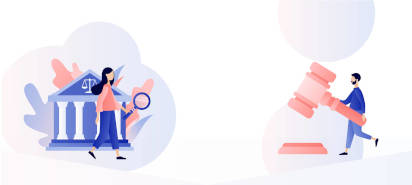Some of your debts have remained unpaid, and a debt collection agency is after you?
Know that regardless of the amount outstanding, you have rights to assert, and the agency has legal obligations to respect. The phone is not supposed to ring in the middle of the night just because you have unpaid bills...

So, how do debt collection agencies work in Quebec, and what are the rights you can assert?
JuriGo explains in detail in the following lines! See what rights you can invoke to defend yourself against harassment from a collection agency, and how to quickly stop such action.
And if you are asked for an unjustified amount, take the time to consult a lawyer. JuriGo has a few who specialize in debt collection among its partners - Fill out a small form and we'll take care of the rest!
What is a collection agency?
A collection agency is a company that collects debts in arrears from another company or individual. For example, a supplier could hire a collection agent to collect the outstanding balance from one of its customers.
Generally, such services are sought after several attempts have been made to obtain payment amicably, but without success. These companies "facilitate" the recovery of outstanding debts in exchange for a service fee.

But hold on! Debt collection agents must hold a license to practice.
As this is a delicate field, companies that offer debt collection services must hold a license issued by the Consumer Protection Office. Under this license, these same companies must identify themselves as "debt collection agencies" or "debt collection agents."
As a debtor, make sure to properly identify the agency before dealing with it! You have the right to demand its license number and verify its validity with the OPC. This is an essential precaution to take, by the way!
The operation of collection agencies is strictly regulated to protect defaulting debtors against abusive practices.
See the extent of your rights (and those of agencies) in the following lines!
What licenses should collection agencies hold?
As mentioned, collection agencies must hold a license to offer their debt collection services. In fact, the activities of these agencies are strictly regulated in Quebec!
But how can you verify that you are dealing with a real agency?
By asking the person who contacts you on behalf of the agency for their license number. With this license number in hand, you can contact the Regional Office of the OPC or verify online using the "Find out about a merchant" tool.
The Office of Consumer Protection is here for you!
The OPC not only serves to verify the compliance of the agency, but the agency also pays a deposit to the OPC which can be used as compensation in the event of a dispute. In case of legal disputes, this deposit will serve as compensation (if you win) and is guaranteed by the OPC.
Checking the agency's license is an essential step to take before dealing with a debt collection agency.
Watch out for PROHIBITED ACTIONS by debt collection agencies!
Debt collection agencies are also regulated by law in the way they approach you. They cannot engage in illegal maneuvers or abusive actions towards you in order to recover a debt.

Here are some of the prohibited actions that debt collection agencies must avoid at all costs!
Trying to make you believe that you are at risk of criminal penalties
Having a debt in arrears is not a crime, and the agent contacting you cannot make you believe that you are at risk of any criminal repercussions.
Contacting you in a way other than indicated
You have the right to demand that the agency only contacts you in writing following their initial contact. The agency must respect this request!
Demanding payment from someone other than you
The agency is entitled to approach only two people to recover a debt; the defaulting debtor, or their endorser, if there is one. No other family member or friend can be targeted for recovery.
Threatening, using undue pressure, and harassing
Threatening a debtor in default, using verbal violence, and harassing them in order to recover money are all strictly prohibited by law. An agency that uses such methods exposes itself to sanctions from the OPC.
Communication: how can a debt collector contact you?
A debt collection agency cannot contact you anytime and in any way! If you have been contacted in the middle of the night to recover an outstanding debt, know that such an action is completely illegal.
To comply with the law, the debt collector must contact you:
-
Mandatory on weekdays, from Monday to Friday between 8am and 8pm (No contact allowed on holidays).
-
The agent who contacts you is obliged to identify themselves.
-
The initial contact must be made in writing. It is possible to request that all subsequent contacts also be made in writing.
The request to be contacted only in writing lasts a maximum of 90 days.
At the end of this 3-month period, you will need to reiterate your wish to be contacted only in writing, otherwise the agency will be entitled to call you again. After sending the initial notice, the collection agent must then wait 5 days before contacting you by phone!
If a debt collection agency contacts you in violation of these rules? Contact a lawyer to defend yourself against such abusive actions!
You are transferred to collections - What are the consequences?
Being "sent" to collections and dealing with an agency is far from a simple annoying formality. It is a procedure that has concrete effects on your credit history, and could negatively impact your future plans.
The fact that one of your debts ends up in collections is very damaging to your credit report!
| When a debt is transferred to collections, the credit rating of the delinquent debtor drops to R9. This is the worst credit rating that can be displayed, and it is the same as that assigned to bankrupt individuals. |
|---|
But what will be the consequences of debt collection on your credit in general? Debt collection will have the effect of complicating several financing processes. Namely;
-
Obtaining loans becomes more complex.
-
Borrowing conditions are less advantageous.
-
Interest rates on loans are higher.
-
It is likely to be refused credit!
Being transferred to debt collection is far from consequence-free.
If you have been sent there by mistake, unfairly or illegitimately, consult a lawyer to defend your interests. By filling out our short form, JuriGo can refer you to one of them in just a few clicks!
5 essential rules to know about collection agencies!
1) Collection agencies have no legal power
Although they may seem intimidating when they contact you to collect what is owed, collection agencies have no binding power. Why?
Because it is not with them that you contracted a debt! There is therefore no legal link between you and the collection agent, which prevents them from taking legal action against you.

2) Communication with the collection agency is regulated by law
As mentioned, the agency can only contact you between 8am and 8pm on weekdays, and they must respect your request to be contacted only in writing if you ask.
3) Collection agents cannot claim any fees from the debtor
Collection agencies can only collect the outstanding debt from the debtor (including accrued interest). They cannot ask for any fees for account collection, as this is prohibited by law.
However, banks, credit unions, insurance companies, and some trust companies are excluded from this prohibition. They can therefore claim legal fees incurred by the recovery of the debt, as well as those incurred by the sale of the property.
4) It is mandatory to hold an OPC license
The field of money lending has long been targeted by predatory and abusive practices. It is no wonder that the OPC now requires a license for debt collection agencies!
Check with the Office to see if the agency contacting you actually holds a valid and up-to-date license, and is not subject to any sanctions. This is a check that only takes a few minutes, and can save you a lot of trouble.
5) A debt can be prescribed by the passage of time…
An outstanding amount of money does not last forever. The creditor has a maximum amount of time to act and recover what is owed. In general, the creditor has a maximum of 3 years to claim the money, otherwise the debt becomes extinguished by prescription.
How to stop debt collection efforts?
Are you tired of being harassed by debt collection agencies?
Unfortunately, there are only a limited number of options to put an end to the persistent efforts of an agent. Here are the different ways to stop their incessant calls and resolve your debt issue!
1) Repaying outstanding debts
Do you really owe the money that is being demanded of you? It is possible to negotiate a repayment agreement with the agency in order to reduce the amount required.
In any case, repaying the outstanding amount is an effective way to put an end to the collection process.
2) Consulting a licensed insolvency trustee
Are you refusing to pay the debt simply because you cannot afford it? In that case, consulting a licensed insolvency trustee could allow you to benefit from the protection of the Bankruptcy and Insolvency Act.
The consumer proposal and the concordat proposal are two recovery processes that could allow you to start again on a solid financial footing.
3) Contesting the validity of the claimed debt!
Do you believe that the debt claimed by the collection agency is unjustified? In that case, consult a lawyer to challenge the process and defend yourself against the attempted collection.
Myths and Realities of Collection Agencies!
Banks and insurance companies can claim fees in addition to the debt.
Reality! As mentioned, these companies are the only ones that can demand repayment of the fees incurred by the collection. Other companies must limit themselves to repayment of the principal and interest.

You have the right to obtain a statement of account and a receipt from the collection agency.
Absolutely! The collection agent must provide you with a statement of account of the payments you have made, as well as a receipt confirming the full repayment of the debt once it is paid.
Can the collection agency contact you at WORK?
It depends! They cannot contact you at work unless the agency has already tried to contact you at home without success, does not have your personal contact information, or if you give them explicit permission.
Can the collection agent contact your FAMILY MEMBERS?
The collection agency has the right to directly contact your endorser (guarantor), if such a guarantee was part of the loan.
Otherwise, the agency is only allowed to contact one of your family members once, for the purpose of asking for your phone number or address.
Problem with debt collection? Speak with a lawyer!
Are you being asked to pay a debt that doesn't belong to you? Is the amount demanded and the interest applied exaggerated? Don't just sit there!
Consult a lawyer specializing in debt collection in your area to explore your options. JuriGo has several to refer you to, no matter where you live in Quebec.
All you have to do to meet with a lawyer for free is fill out our form in less than 2 minutes, and we'll take care of the rest.
JuriGo's contact service is free and doesn't commit you to anything – What are you waiting for to meet with a specialized lawyer?
